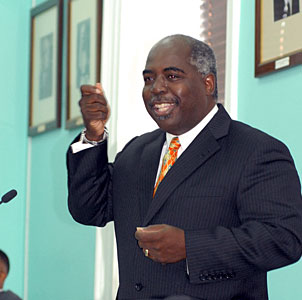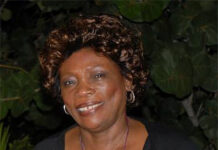
CONTRIBUTION
BY HON. PHILIP E. DAVIS
MEMBER OF PARLIAMENT
(CAT ISLAND, RUM CAY, AND SAN SALVADOR)
DEPUTY PRIME MINISTER
AND
MINISTER OF WORKS & URBAN DEVELOPMENT
TO THE CONSTITUTIONAL AMENDMENTS DEBATE
ON
AUGUST 18TH, 2014
HOUSE OF ASSEMBLY
COMMONWEALTH OF THE BAHAMAS
NASSAU, NEW PROVIDENCE
Introduction
Mr. Speaker
Thank you for recognizing me.
As I stand, I am privileged to do so on behalf of the people of Cat Island, Rum Cay, and San Salvador – whose trust and confidence permit me to be here.
On their behalf, I remain focused on the task at hand, committed to ensuring the sustained growth and development of the Bahamian people.
Mr. Speaker,
When we assemble here, though we sit on opposite sides, we do so with a common goal – that is to provide the framework for a better Bahamas.
We can achieve this goal only by representing the views and aspirations of the Bahamian people and by making and revising laws.
Together, the sole vehicle to achieving our goal is “CHANGE”.
This change that we all hope for to achieve targets a people that we all love and seek only to uplift.
Mr. Speaker
Notwithstanding the objective, conversations are often difficult when they centre on change.
In fact, sometimes the conversations become clouded…toxic…and many times combative.
When they take on combative facades – too often become zero-sum games – that is, they become situations in which the gain is equivalent to the loss, so the net change in benefit is zero.
Mr. Speaker
We must, by the tenor of our conversations, ensure that change in this place benefits those that we represent.
……Especially concerning the matters we debate here, we must seek to ensure that real enemies, which I identify as stagnation and irrelevance, are not factors in our conversation.
I encourage all of us to focus solely on the facts concerning this debate so that we move toward clarity for Bahamians, who look to us to set the pace before advancing the questions to them.
For me, Mr. Speaker
These issues are very simple.
However, I continually remind myself that if, in fact they were; the conversation would be far simpler.
So in identifying the complexities, I move to the middle in an effort to refocus and keep sight of the goal we set out to achieve.
Mr. Speaker
When this debate was foreshadowed by the Rt. Hon. Member for Centreville three weeks ago, the Member for Killarney and Leader of the Opposition said [and I quote]:
“Though there is much which divides us in this place, let us speak with one voice when the issue is equality before the law. Let us, Mr. Speaker, speak as one in this place.
If we can do so, we will signal to every Bahamian and the watching world our unified commitment to the advancement of human dignity in our beloved Bahamas.
The success of this effort will require a bold and unified, multi-partisan and multi-sectoral effort on the part, not just of the political parties, but of civil society organisations, the Constitutional Commission, as well as social, civic and religious leaders.”
Even in the face of the Member’s subsequent ‘flip-flop’, I am confident that, after healthy debate, we will work together to ensure that good is the net worth for and on behalf of all Bahamians.
Mr. Speaker
I wish to lend my voice to the chorus commending the work of the members of Constitutional Commission, who have conducted a comprehensive review of the Constitution of The Bahamas.
The Commission, chaired by former Attorney General Sean McWeeney, QC, recommended significant changes to the Constitution.
Their task was far from easy and is far from over.
I entreat them to continue their good work to ensure as far as possible that all recommendations are properly considered and that key revisions are properly communicated to and understood by every Bahamian on every island of The Bahamas.
I also add mine to the voices of other Members, who have commended the interventions given by the women of this honourable House.
The Members for Englerston, Yamacraw, Long Island, Sea Breeze, and South Beach have all acquitted themselves with distinction.
I must point out that the Member for Englerston caused me to take another look at my approach because she so ably justified the case for bringing parity between men and women.
Then, I had to recover from the crack of Long Island’s whip, but she too must be especially commended for remaining steadfast in the face of the battle.
Even outside of this place, she is resolute in duty; getting correct information to the public.
Mr. Speaker
It has been said that circumstance does not shape us, it reveals who we really are.
At this time and under this circumstance, I am concerned by the tenor of conversations that emanate from here, public forums including the radio talk shows, print media, and online social media.
Mr. Speaker
This tenor begs questions concerning our Christian values, how we really feel about people generally, how we feel about things foreign, how we feel about things different, how we feel about human rights.
Who are we, Mr. Speaker?
Are we the same Inheritors of and Successors to this Family of Islands, that recognise the Supremacy of God and believe in the Fundamental Rights and Freedoms of the Individual?
Are we still committed to the Establishment of a Free and Democratic Sovereign Nation founded on Spiritual Values and in which no Man, Woman or Child shall ever be Slave or Bondsman to anyone or their Labour exploited or their Lives frustrated by deprivation?
Are we truly a Bahamas fashioned by the same Constitutional Articles that created the Commonwealth of The Bahamas with “indivisible Unity […] under God”?
Mr. Speaker
I want to believe that we are.
And Mr. Speaker
I believe that we are because we are built of a strength and determination that derives from our forebears, who endured the test of enslavement to a people that fought to maintain the status quo to boost economies and fatten their pockets.
The oppressors argued that slavery had existed throughout history and was the natural state of mankind.
They even turned to the Bible citing the widespread use of slaves under the Old and New Covenant.
They said that Jesus never spoke out against it.
They argued that the institution was divine, and that it brought Christianity to the heathens from across the ocean.
They used the courts to strip all blacks – not just slaves – of their legal standing as persons naming them as mere property.
The oppressors had Constitutional permission to retain their positions of dominance.
Fast-forward to today, Mr. Speaker
Defence of slavery is inexplicable, incomprehensible, and irrational.
But the parallels of this history are akin to the arguments that I hear raised today concerning women.
Meanwhile, Galatians 3:28 tells us “There is neither Jew nor Greek, there is neither slave nor free man, there is neither male nor female; for [we] are all one in Christ Jesus.”
This is the New Covenant reality, Mr. Speaker. God has no favourites. We are all equal in his sight.
Mr. Speaker
Men and women before us fought for the right to vote for all males of 21 years of age and older; and soon the property qualification for voting, the company vote, and plural voting were all abolished.
Years later, women too secured the right to vote.
Today, the property and plural voting scenario is also an absurdity by any stretch of the imagination. One man (male or female), one vote is taken for granted.
Mr. Speaker
As it stands, our Constitution yet holds the vestiges of injustice that Dame Doris Johnson say “stirs a revolt in the hearts of Bahamian Women”. Her plea echoes over the ages “before honourable men [and women]”.
Mr. Speaker
Dame Doris’ words could have been spoken today with the same effect. Even in The Faith That Moved the Mountain, Sir Randol Fawkes noted that “[women] lagged far behind their male counterparts in the field of human rights.”
He further argued that, among other things, the attitudes of men and women towards their respective roles in society, other disadvantages including the inheritance law of primogeniture and the inadequate maintenance laws for child support were issues that required redress.
This Parliament, in times previous to now, enacted legislation to remove biases in respect of property and inheritance laws, child support, and other significant areas in an effort to remove the errors of legislation.
So you see, Mr. Speaker
Time and circumstance allow for changes.
I believe that the time is now and the circumstance ripe to effect critical changes that will remove the remaining vestiges of discrimination from our Constitution.
The Bahamas Constitution (Amendment) (No. 4) Bill, 2014
Mr. Speaker
I turn firstly to Amendment Bill No. 4, which seeks to amend paragraphs (3) and (5) of Article 26 to include “sex”, and appears to be among the most controversial of the amendments.
The unfortunate chatter, in and outside this House, fuelled by whatever motive, is distracting from the real purpose of this Bill…..Equality between Man and Woman.
This amendment is critical to what we are seeking to do. It is the foundation upon which all of the other amendments are constructed.
For a point of reference, the word “sex” exists now in Article 15 of the Constitution, entitling Bahamians “to the fundamental rights and freedoms […] whatever his race, place of origin, political opinions, colour, creed or sex”.
This wording has existed there since the enactment of our Self-Governance Constitution in 1964.
Mr. Speaker
As it stands, paragraph (3) of Article 26 of the Constitution defines “discriminatory” as the permitting of “different treatment to different persons [on the bases of] race, place of origin, political opinions, colour or creed…”
Paragraph (5) restricts the enactment of any law that is discriminatory in respect of “race, place of origin, political opinions, colour or creed”.
In each of the cited paragraphs, the amendments will cause the discriminatory definition to read as “race, place of origin, political opinions, colour, creed or sex” so as to regurgitate the same template as Article 15.
Mr. Speaker
I take note that the Constitutional Commission has foreshadowed consideration being given to further amendment to cause the definition of sex to be included in the Constitution as meaning “male and female”.
That is a good thing, Mr. Speaker. It tells me that they are listening; and that we live in a healthy democracy.
But even without this, Mr. Speaker
These amendments cannot pave the way for same sex marriage.
I hear the noise in the market; and I recognise the mischief. And I have identified some of the mischief-makers … even in this place…
However, let us take the sensible path to subparagraph (4)(c) of Article 26.
Any suspicion that the amendments may permit same sex marriages can be quashed here.
This paragraph specifically allows for discrimination when it comes to the laws of marriage.
Mr. Speaker
For emphasis, I reiterate that this argument in no way relates to the Amendments before us, but for the sake of clarity, we may look to the law.
The Bahamas is governed by Domestic Legislation.
In this regard, there is a Marriage Act, which, supported by the Matrimonial Causes Act, defines marriage as between a man and a woman.
Our law provides that any union between parties of the same sex is deemed null and void.
It cannot happen.
At this point it may be useful to address the concerns of the Member for Marco City and hopefully allay his concerns or fears sufficiently to enable him to revisit his position on this Bill.
His concerns appear to be premised on the view firstly, that to include the word “sex” is to open the door to prohibit discrimination on the basis of anything to do with sex.
Secondly, that the case of Corbett v Corbett , which counters this assertion, has been overruled by the English Courts and ECHR, (that is, The European Courts of Human Rights).
This is not a correct interpretation or reading of the cases.
It is settled law that sex means man or woman in the context of marriage or matters related to personal law.
Secondly, there has been no reversal in any court of this long-standing definition.
In fact, I would add that it has been repeatedly affirmed rather than overruled.
The one Cardinal principle in the practice of law that all practitioners will do well to adhere to, is that the law is the law.
There should be no disagreement of what the law is.
Disagreement is left to its application to facts.
The Goodwin case did not overrule Corbett.
This case was discussed by the House of Lords (The Supreme Court) in Bellinger v Bellinger.
The facts of these cases concerned transsexuals and the distress they suffer.
Save Goodwin, the cases concerned the validity of a marriage to which one of the parties was a transsexual and whether the transsexual is to be recognised in the acquired gender.
In other words, the issue was the recognition of gender reassignment.
In each case, recognition was not given as it necessitated giving the expressions “male” and “female” a novel, extended meaning that a person may be born with one sex, but later become (by surgical intervention), or become regarded as a person of the opposite sex.
The Goodwin case did not concern marriage.
The complaint was that she was not being treated fairly by the laws or practices of the UK.
She was unable to make complaints of sexual harassment, unable to receive pension at 60, etc.
The ability to marry was not her complaint, but the court expressed its views on this and other aspects of the legal recognition for gender reassignment.
The Court held that this breached Articles 8 and 12 of ECHR.
In the case of Bellinger v Bellinger , though the Court held that the definition of male and female as it relates to marriage was incompatible to these Articles, it employed the measure of last resort by affirming the domestic law and giving a declaration of incompatibility.
This is because the words male and female were sufficiently plain to disable it from being read and given effect in an ECHR compliant world.
If there are any differences expressed in the cases, it is not related to the meaning of sex (male or female) but rather the factors that are taken into account to determine whether a person is male or female (Indicia—Chromosomes, Gonads, Genitals (internal & external), hormonal patterns, style of upbringing and living, and self-perception.
Mr. Speaker
In the Bellinger Case, the House of Lords determined that the recognition of gender reassignment for the purposes of marriage was a matter for Parliament, not for the Courts.
And for The Bahamas, statute law related to marriage has that prescription nigh on set in stone.
Mr. Speaker
The red herring that is same-sex marriage is nothing more than a distraction from the relevant and important issues that we seek to remedy.
In fact, Mr. Speaker
Surely the trappings of statute and the Courts would assure any Christian sensibility that perceived offence by this amendment. The insertion of the word “sex” is not synonymous to the insertion of the words “sexual orientation”; sex refers to the same “male and female [that] He created them”; and marriage will remain as between a man and a woman.
There is no mix up here, no “quagmire of web” that the Leader Opposite has so awkwardly put it.
There is no mischief on our part.
Mr. Speaker
Women have had to take on roles and responsibilities that those who penned the Constitution could not have imagined.
They are the backbone of our society – politics, government, business, finance, education, everywhere!
But, their roles have expanded from nurturing support, which has its own benefits, to sole breadwinner.
It is time for us to remove whatever remaining impediments remain to their full enfranchisement.
Mr. Speaker …. We have the opportunity to right a wrong.
We have an opportunity to level the playing field to recognize that women should have and deserve to have equal rights.
As I said before, Amendment 4 is critical to everything else that is before us today.
It is about equality and it is about freedom.
We are a free and sovereign nation.
This freedom, therefore, must, as of right, flow unimpeded to all men and all women.
This freedom will also permit all children born of Bahamians anywhere to claim their entitlements.
We are talking about freedom,
Mr. Speaker. This is only right, fair, just, and reasonable.
The Bahamas Constitution (Amendment) Bill, 2014 Mr. Speaker
Bill Number (1) seeks to institute equality between sexes by enabling a child born outside The Bahamas to automatically become a Bahamian citizen at birth if either of his parents is Bahamian.
The Constitution currently allows this only for the child of a Bahamian man.
Here, we can take note of why this is so essential.
Women are taking leading roles in careers that were formally dominated by men; and for the most part, they secure the qualification for these careers through travel.
These women should be considered no less Bahamian because of their sex and who they choose to marry.
Mr. Speaker
Any Bahamian man can automatically pass on his citizenship.
By contrast, women do not have the same entitlement. That is not right. That is not fair. That is not just. That is not reasonable.
Mr. Speaker
I contend that all Bahamians – male and female – have a fundamental right to fair, just, and reasonable terms and conditions for living.
The contributions of Bahamian women have laid the foundation for the success of The Bahamas.
Notwithstanding the enormity of their contribution, our Constitution allows targeted discrimination, which must be eliminated.
What we seek to do only begins to repay a debt that The Bahamas owes to our women and to the affected children.
Mr. Speaker
The Bahamas Constitution (Amendment) (No. 2) Bill, 2014
Mr. Speaker
As I turn attention to Amendment Bill No. 2, we see that our Constitution currently seems to impel Bahamian women to exercise control of their emotions and save themselves exclusively for Bahamian men if they wish their children to enjoy the entitlements of Bahamian citizenship.
Love has no boundaries, no nationality, no distinguishing creed, Race does not matter.
For my daughters, I want them to be able choose to be with whomever they wish.
We see so many professional women who have travelled abroad for education, met, fell in love with and married men, moved back home to make meaningful contribution to The Bahamas; and their foreign husbands who more-often-than-not also make significant contributions.
However, these women are not accorded the privilege of passing her citizenship to their spouses.
Mr. Speaker
The Bahamian man does not have this impediment because he, by happenstance, possesses the Y-chromosome.
That is not right. That is not fair. That is not just. And, that is not reasonable.
In order for us to continue to build The Bahamas that we want, utilising all of our human resources – male and female – we must accord our women their due.
Surely these Constitutional Amendments cannot remove the man as the head of his household, if that is how he is perceived in his family.
Surely these amendments have no bearing on how the Christian families choose to behave in their households.
Husbands and wives should complement each other, Mr Speaker.
Mr. Speaker
The argument has been proffered that The Bahamas is the only developing or developed country that entitles men to citizenship for their wives; and that we should not extend this right to women.
Mr. Speaker
The fact of the matter is that the Bahamian man has the entitlement because; the framers of our Constitution saw it as fitting in respect of his wife.
It is the right thing to do to encourage Bahamians to remain at home.
It is the right thing to do to encourage the institution of marriage; and since it is right thing to do for the Bahamian man, it is also right, fair, just, and reasonable to accord the same to Bahamian women for their husbands.
What’s good for the goose should be good for the gander.
The Bahamas Constitution (Amendment) (No. 3) Bill, 2014
Mr. Speaker
This exercise is not only about righting the cart for Bahamian women and their children.
With the passage of Amendment No. 3, we are seeking to remedy discrimination toward children born out of wedlock to Bahamian men as well.
As it stands, the unmarried Bahamian woman can naturally pass citizenship to their children.
The unmarried Bahamian man in the same situation, even upon confirmation of parentage, cannot do the same if he fathers a child with a foreign woman.
That, too, is not right, nor is it fair, nor is it just, nor is it reasonable.
Mr. Speaker
Some Bahamian women take issue with this Amendment, which will entitle the children to citizenship at birth when born out of wedlock to Bahamian men.
It has been said that it would validate the children of restless Bahamian men.
Well, Mr. Speaker
In the same way that the Y-chromosome should not afford the Bahamian man entitlements over Bahamian women, it should not deprive him of such entitlements that are afforded the Bahamian woman.
For those who would deny that discrimination exists toward men, here is clear evidence; and this discrimination also undermines the cause for women’s equality.
So, Mr. Speaker
We have to fix it.
I am convinced that we are doing the right thing.
And as a nation, I am convinced that we are objective enough and mature enough to see that.
I am also convinced that we will, at referendum, evidence our national maturity to an international audience.
Mr. Speaker
As I move to conclude, I wish to point out that all of the issues that we have taken into consider here have as its chief interest the Rights of the Child.
It was Nelson Mandela who, if I may say so, rightly articulated that “There can be no keener revelation of a society’s soul than the way in which it treats its children.”
I will add to his sentiment – treatment of the elderly and the disabled.
The great Mahatma Gandhi once said: “To call woman the weaker sex is a libel; it is man’s injustice to woman. If by strength is meant brute strength, then, indeed, is woman less brute than man. If by strength is meant moral power, then woman is immeasurably man’s superior. Has she not greater intuition, is she not more self-sacrificing, has she not greater powers of endurance, has she not greater courage? Without her, man could not be. If nonviolence is the law of our being, the future is with woman. Who can make a more effective appeal to the heart than woman?”
[To the Women of India (Young India, Oct. 4, 1930)]”
Mr. Speaker
We find ourselves in this time and circumstance to affirm that we not only value the foundation of our forebears, giving all of us an invitation to wholly participate in the building of a better Bahamas.
Winston Churchill once said that “The best argument against democracy is a five-minute conversation with the average voter.”
Fortunately, I am an optimist and do not ascribe to Sir Winston’s view for the Bahamian people.
I firmly believe that we want to get it right as a people.
That is the legacy that we want to leave.
Generations to come, let it not be said that we erred yet again – neither in this place, nor by the process of the referendum.
Mr. Speaker
I firmly believe that we have achieved a condition of national maturity that will cause us to recognise, rationalise, and rectify the irregularity between international law, in this case, the Convention on the Elimination of All Forms of Discrimination against Women, and domestic law, that is, the Constitution.
As well, I firmly believe that, for the sake of taking this matter to remediation, Bahamians – including all members in this place – can rise above political polarisation to achieve the consensus required for constitutional reform.
Mr. Speaker
The world is watching us on these issues.
The Bahamas acceded to the Convention on the 6th of October 1993.
In doing so, we became the last country in the Caribbean to take that action.
Imagine that! The Bahamas, last!
Our Commonwealth Caribbean counterparts were well ahead of us.
Mr. Speaker
At our signing, we entered reservations to those provisions of the Convention which require states to amend their Constitutions and laws to grant women formal equality with men in all respects, including the ability to confer citizenship upon their children.
I want to believe, Mr. Speaker, that we entered those reservations only to give us time to get domestic law together.
I look forward to the day when we can say to the United Nations that we have removed those impediments and our reservations.
Mr. Speaker
Some wise soul once said, “If nothing ever changed, there’d be no butterflies.”
Our actions now with the passage of the Amendment Bills and successful referendum will indicate to the world that we have revised our ways and, in every respect, affirm our women as equal counterparts for the building of a better Bahamas.
Mr. Speaker
Proverbs 3:27 says that we must not “withhold good from those to whom it is due, when it is in your power to do it.”
The power rests with us, colleagues.
We have an opportunity to do good.
We must do what is right, fair, just, and reasonable. The world is watching us….
And So Mr. Speaker….
This member lends Cat Island, Rum Cay, and San Salvador’s full support to the Constitution Amendment Bills and to the Status of Children Amendment Bill.








![A Con Artist [RACIST] wants Bahamians to fight progress – WELL, WHAT IS THIS?!](https://www.bahamaspress.com/wp-content/uploads/2025/07/Toby-Smith-218x150.jpg)
